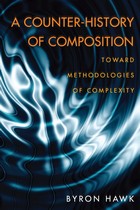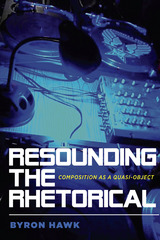
A Counter-History of Composition contests the foundational disciplinary assumption that vitalism and contemporary rhetoric represent opposing, disconnected poles in the writing tradition. Vitalism has been historically linked to expressivism and concurrently dismissed as innate, intuitive, and unteachable, whereas rhetoric is seen as a rational, teachable method for producing argumentative texts. Counter to this, Byron Hawk identifies vitalism as the ground for producing rhetorical texts-the product of complex material relations rather than the product of chance. Through insightful historical analysis ranging from classical Greek rhetoric to contemporary complexity theory, Hawk defines three forms of vitalism (oppositional, investigative, and complex) and argues for their application in the environments where students write and think today.
Hawk proposes that complex vitalism will prove a useful tool in formulating post-dialectical pedagogies, most notably in the context of emerging digital media. He relates two specific examples of applying complex vitalism in the classroom and calls for the reexamination and reinvention of current self-limiting pedagogies to incorporate vitalism and complexity theory.


The essays in Small Tech investigate the cultural impact of digital tools and provide fresh perspectives on mobile technologies such as iPods, digital cameras, and PDAs and software functions like cut, copy, and paste and WYSIWYG. Together they advance new thinking about digital environments.
Contributors: Wendy Warren Austin, Edinboro U; Jim Bizzocchi, Simon Fraser U; Collin Gifford Brooke, Syracuse U; Paul Cesarini, Bowling Green State U; Veronique Chance, U of London; Johanna Drucker, U of Virginia; Jenny Edbauer, Penn State U; Robert A. Emmons Jr., Rutgers U; Johndan Johnson-Eilola, Clarkson U; Richard Kahn, UCLA; Douglas Kellner, UCLA; Karla Saari Kitalong, U of Central Florida; Steve Mann, U of Toronto; Lev Manovich, U of California, San Diego; Adrian Miles, RMIT U; Jason Nolan, Ryerson U; Julian Oliver; Mark Paterson, U of the West of England, Bristol; Isabel Pedersen, Ryerson U; Michael Pennell, U of Rhode Island; Joanna Castner Post, U of Central Arkansas; Teri Rueb, Rhode Island School of Design; James J. Sosnoski; Lance State, Fordham U; Jason Swarts, North Carolina State U; Barry Wellman, U of Toronto; Sean D. Williams, Clemson U; Jeremy Yuille, RMIT U.
Byron Hawk is assistant professor of English at George Mason University.
David M. Rieder is assistant professor of English at North Carolina State University.
Ollie Oviedo is associate professor of English at Eastern New Mexico University.
READERS
Browse our collection.
PUBLISHERS
See BiblioVault's publisher services.
STUDENT SERVICES
Files for college accessibility offices.
UChicago Accessibility Resources
home | accessibility | search | about | contact us
BiblioVault ® 2001 - 2024
The University of Chicago Press









